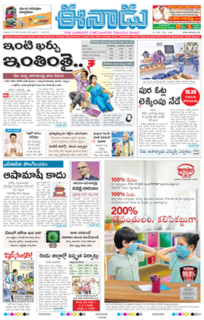
Eenadu is the largest circulated Telugu-language daily newspaper of India sold mostly in the states of Andhra Pradesh and Telangana. According to the Indian Readership Survey (IRS) Q2 2019, Eenadu ranks eighth among the most circulated Indian-language dailies with a total readership (TR) of 1,614,105. It was founded by Ramoji Rao in 1974.
Andhra Prabha - Journalism first is a Telugu language daily newspaper of India sold mostly in the states of Andhra Pradesh and Telangana. The newspaper is one of the oldest running Telugu language daily newspapers of India. The newspaper and website (www.prabhanews.com) were owned by the New Indian Express Group of Companies but the newspaper was sold to entrepreneurs from Kakinada, Andhra Pradesh. The newspaper is owned by Mootha Gopalakrishna, former M.L.A of Kakinada city. The newspaper publishes neutral news not in support of any political organisation and is the one of the most balanced and close-to-reality Telugu language daily newspapers.

The Filmfare Best Actor Award is given by the Filmfare magazine as part of its annual Filmfare Awards South for Telugu films. The awards were extended to "Best Actor" in 1972. The year indicates the year of release of the film.

Kasinadhuni Nageswararao, better known as Nageswara Rao Pantulu, was an Indian journalist, nationalist, politician, businessman, and a staunch supporter of Khaddar movement. He participated in the Indian independence movement and in the Indian National Congress party, including Mahatma Gandhi’s civil disobedience movement through salt satyagraha. He was conferred with the title Desabandhu by the people of Andhra Pradesh. He was a major financier of Congress activities in Andhra and Chennai and is also known for patenting Amrutanjan. He was conferred with the title Desoddhaaraka by the Andhra Mahasabha. In 1935, the Andhra University honoured him with Kalaprapoorna, an honorary doctorate of Literature.

Sivalenka Sambhu Prasad was a journalist and Indian National Congress politician, who took over the Daily News Paper Andhra Patrika, Andhra Sachitra Vara Patrika and Bharathi which were published from Chennai City which was the capital of Composite State of Madras from his father-in-law Kasinadhuni Nageswara Rao, the founder of Andhra Patrika group of publications in 1903, inventor of "Amrutanjan", a pain balm with natural ingredients, in 1893 and a freedom-fighter. After taking over he led the group of publications from 1938 to 1972. Rao also bequeathed all properties and Amrutanjan business to Sambhu Prasad, which he ran along with publications. During Sambhu Prasad's lifetime there were many important events in India, including the Second World War, the Independence of India, and much of the life, and the death, of Mahatma Gandhi. He was called "Ayyavaru" by his employees. The centenary of his birth was celebrated in 2011 by a function was attended by dignitaries and journalists, including Chief Minister of Andhra Pradesh Konijeti Rosaiah.
Madhavapeddi Satyam was an Indian singer and stage-actor working mainly in Telugu cinema. He entered films as a singer-actor in Y.V. Rao's Tamil-Hindi bilingual movie Ramadas in the year 1946, playing the role of Kabir. However, he became more popular as a playback singer due to his booming voice. His voice suited artists like S. V. Ranga Rao, Relangi and Ramana Reddy. He also sang for others like Akkineni Nageswara Rao, N.T. Rama Rao, Jaggayya and Padmanabham. In a five-decade long career he sung numerable songs of which few became popular, like "Vivaha Bhojanambu", from the film Maya Bazar for S.V Ranga Rao, and "Ayyayyo Jebulo Dabbulu Poyene", from the film Kulagothralu for Ramana Reddy.

Madiraju Ranga Rao is a scholar of Telugu Literature, associated with Classical Literature, Indian Poetics, Modern Poetry, Novel & Criticism and Studies in Sanskrit Literature.
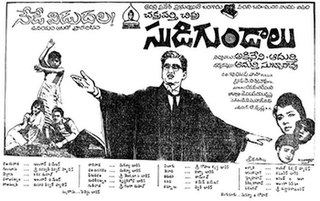
Sudigundalu (transl. Whirlpools) is a 1968 Indian Telugu-language philosophical film, produced by Akkineni Nageswara Rao, Adurthi Subba Rao under the Chakravarthy Chitra banner and directed by Adurthi Subba Rao. It stars Akkineni Nageswara Rao, and has music composed by K. V. Mahadevan. It was released on 28 June 1968. The film won the National Film Award for Best Feature Film in Telugu, The Nandi Award for Best Feature Film, and the Filmfare Award for Best Film – Telugu. It marked the debut of Nageswara Rao's son Nagarjuna as child artist in a cameo. The cult classic film was screened at the Tashkent Film Festival, and the International Film Festival of India.

Chilaka Gorinka is a 1966 Indian Telugu-language film produced and directed by K. Pratyagatma. The film won the Nandi Award for Best Feature Film from the government of Andhra Pradesh. Sri Sri wrote the lyrics for the film, while S. Rajeswara Rao provided the music score. This is the debut film for actor and politician Krishnam Raju and also for the comedian Rama Prabha.
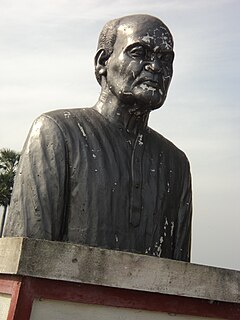
Vaddadi Papaiah (1921–1992), name sometimes spelt Papayya, pen-name Vapa, was a painter, cover artist and illustrator for Telugu magazines, known especially for his covers for the children's magazine Chandamama.

Upādhyāyula Sūryanārāyaṇa Rāo (1923–1971) was a Telugu playwright and journalist who lived and worked in Vizianagaram, Andhra Pradesh. He was the grandson of the pandit Ajjada Adibhatla Narayana Dasu. A school drop-out, he educated himself in literature, history and philosophy. He was actively associated with the Telugu stage and was one of the founding members of the Sri Vijayarama Nataka Kala Parishat, which regularly conducted drama competitions. He was often invited by other organisers as a judge for drama competitions. He was associated with the Praja Socialist Party in its early years.
Andhra Patrika was the weekly newspaper of the nationalist movement in the Telugu speaking region founded by Kasinadhuni Nageswara Rao in 1908. It later transformed into a daily newspaper before it closed down in 1991. It helped to shape both modern Telugu language and an identity that resulted in the creation of the state of Andhra Pradesh.

Mangalya Balam is a 1959 Indian Telugu-language romantic drama film, produced by D. Madhusudhana Rao under Annapurna Pictures banner and directed by Adurthi Subba Rao. It stars Savitri and Akkineni Nageswara Rao, with music composed by Master Venu. The film is a remake of the Bengali film Agni Pariksha, which was based on Ashapurna Devi's novel of the same name. It was simultaneously made by the same banner and director in Tamil as Manjal Mahimai.

Kaderbad Ravindranath is an Indian agricultural research scientist and cotton breeder. In 2015, he received the Life Time Achievement Award for his contributions to the cotton research.
Chirag Pratap Lingam Goud popularly known as Pedhanna (1921–1982) is a former MLA of Chevella Constituency, Andhra Pradesh.

Bhale Rangadu is a 1969 Indian Telugu-language drama film, produced by N. N. Bhatt and directed by Tatineni Rama Rao. It stars Akkineni Nageswara Rao and Vanisri, with music composed by K. V. Mahadevan. Released on 14 August 1969, the film was a critical and commercial success.
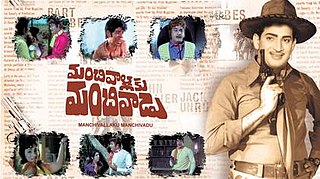
Manchi Vallaki Manchivadu is a 1973 Telugu Eastmancolor action film, directed by K. S. R. Das and produced by S. Bhavanarayana. The film had musical score by Satyam. The action scenes were shot in the villages of Rajasthan.
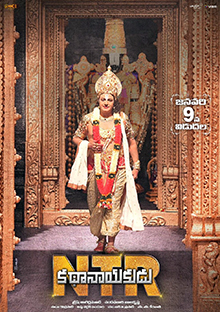
NTR: Kathanayakudu is a 2019 Indian Telugu-language biographical film, based on the real life and acting career of N. T. Rama Rao. It was produced by Nandamuri Balakrishna, Sai Korrapati Ranganatha, Vishnu Vardhan Induri under NBK Films, Vaaraahi Chalana Chitram, Vibri Media banners and directed by Krish Jagarlamudi. The film stars Nandamuri Balakrishna, as his father N. T. Rama Rao, Vidya Balan in Basava Ramatarakam's role in her debut Telugu movie and music is composed by M. M. Keeravani. The film has a sequel, NTR: Mahanayakudu, that showcases the political journey of Rama Rao.













